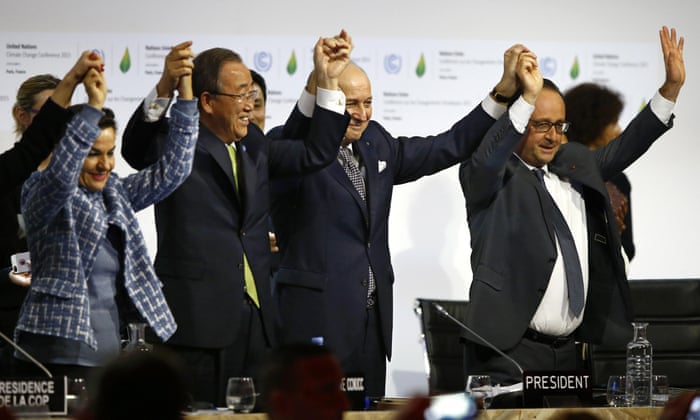A Brief Colonial History Of Ceylon(SriLanka)
Sri Lanka: One Island Two Nations
A Brief Colonial History Of Ceylon(SriLanka)
Sri Lanka: One Island Two Nations
(Full Story)
Search This Blog
Back to 500BC.
==========================
Thiranjala Weerasinghe sj.- One Island Two Nations
?????????????????????????????????????????????????Saturday, November 5, 2016
Keep it in the ground: the Paris climate agreement is now official
Environment
groups hail ‘momentous occasion’ but warn governments need to cut
carbon emissions more steeply to avoid dangerous global warming

The
French president and foreign minister, along with the UN secretary
general and UN climate chief, celebrate agreeing the Paris climate
change deal. Photograph: Francois Mori/AP
The significance of the Paris agreement coming into force today is easy
to miss: it may seem like an anti-climax, given the travails that led up
to its signing last December.
But the moment is of huge importance. This is the first time that a
legally-binding agreement, signed by all of the world’s functioning
governments, has laid down a commitment to limit the growth of
greenhouse gases in the atmosphere with the goal of preventing global
warming exceeding 2C above pre-industrial levels.
This figure was not plucked out of the increasingly carbon-rich air. It
is the limit of what scientists regard as safety, beyond which climate
change will run out of control, unstoppable in its damaging effects.
There are caveats. The Paris agreement is legally binding in forcing
governments to accept and cater for the 2C limit. But the commitments on
curbing greenhouse gas emissions in line with that goal are not legally
binding. This means incoming governments can renege upon them. There
are no sanctions for governments that flout the goals.
The outcome of the US presidential election will be key. Donald Trump,
the Republican candidate whose polling has improved markedly in recent
days, has vowed to cancel the US’s participation in the Paris agreement.
Russia has also failed to ratify the agreement, along with several
other nations. China has ratified, but if US participation is not
forthcoming under a future Trump government, that may be off.
So while the agreement should be hailed as a massive and historic step
forward in international efforts to avoid dangerous levels of global
warming, it is potentially fragile.
Meanwhile, the signs of danger are growing increasingly strong. This year is almost certain, according to Nasa,
to be the warmest on record, following last year’s record-setting
temperatures. This gives the lie to the claims of warming-dismissers
that the upward march of global temperatures has “paused”.
Next year may not set records, but the trend is clear. We are on a
trajectory that may lead to warming that is unprecedented and
potentially irreversible. While there are other encouraging signs - the growth in renewable energy use around the world, the small reductions in emissions in some major economies - we should be in no doubt. The real work of Paris remains to be done.
Fiona Harvey
Environment correspondent, The Guardian

